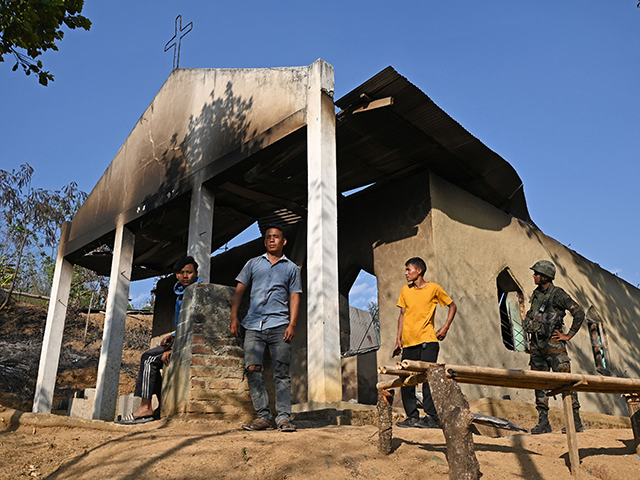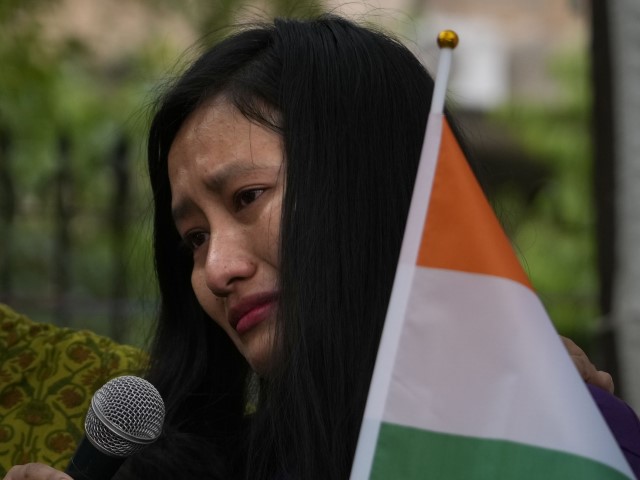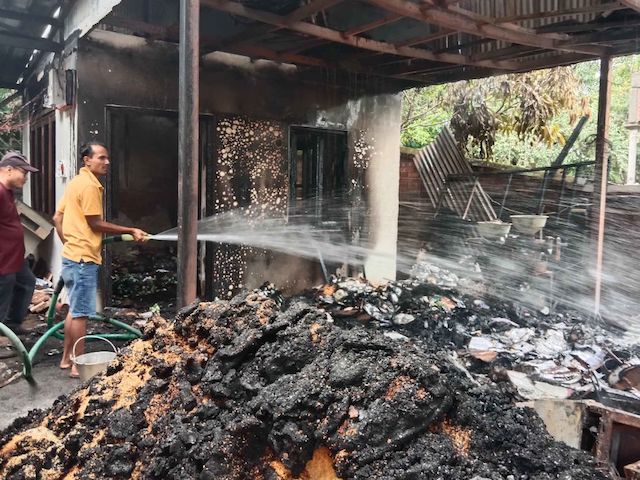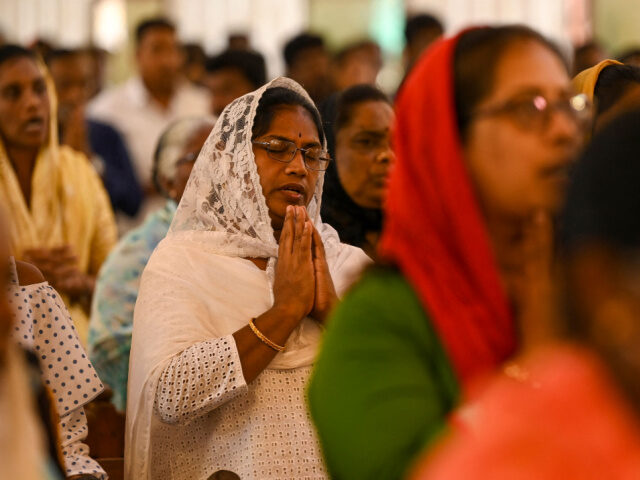The Hindu nationalist government of northern Manipur, India, issued a decree on Wednesday declaring Easter Sunday a work day, triggering widespread outrage and forcing officials to revoke the order a day later.
Manipur is home to dozens of indigenous tribes, many of them Christian-majority, and has experienced an ongoing wave of anti-Christian violence since May, when the largest tribe, the Hindu-majority Meiteis, petitioned the government to be designated a “scheduled tribe.” The designation is meant to aid underprivileged minority communities.
The smaller, mostly Christian tribes in Manipur objected to the Meiteis, the largest and wealthiest tribe in the state, seeking scheduled tribe status, organizing a massive peaceful protest against the designation. The protests prompted massive violent riots by Meitei Hindus, who burned down entire Christian communities, hundreds of churches, and left tens of thousands homeless.

An Indian army soldier (R) stands along with villagers in front of a ransacked church that was set on fire by a mob in the ethnic violence-hit area of Heiroklian village in Senapati district, in India’s Manipur state on May 8, 2023. – Around 23,000 people have fled the unrest, which erupted last week in the hilly northeast state bordering Myanmar. The latest clashes erupted between the majority Meitei people, who are mostly Hindu, living in and around the Manipur capital Imphal and the mainly Christian Kuki tribe of the hills (ARUN SANKAR/AFP via Getty Images)
The Christian tribes, the most prominent of which in the region is the Kuki-Zo, protested that the Meitei assailants had the backing of the local Bharatiya Janata Party (BJP), the ruling party of Prime Minister Narendra Modi. Witnesses said that police officers took the side of the rioters during the unrest and even stood by uselessly as some attackers gang raped and paraded Christian women naked in broad daylight.

A Kuki tribal woman breaks down while narrating the ordeal of her escape after her village was burnt down, during a sit-in protest against the killing of tribals in their northeastern home state of Manipur, in New Delhi, India, Monday, May 29, 2023 (Manish Swarup/AP).
“The police, the local police, don’t protect the Christian churches and in some ways aid and abet the rioters,” David Curry, the head of aid organization Global Christian Relief, told Breitbart News in May. “So the bigger systemic problem is, why does the central government allow this to happen? Why do local municipalities and policemen allow these attacks against churches and Christians and facilitate it?”
Curry noted that many of the rioters upload videos to social media, showing themselves engaging in anti-Christian violence, as “they’re not even afraid to post and call out the attacks on churches on social media because there are no repercussions.”
About 40 percent of the population of Manipur is Christian.
The rampant violence of 2023 has partially subsided, but as of this week, targeted attacks have destroyed 600 churches in Manipur and left 50,000 people homeless, surviving in poorly maintained government-run camps. Modi has largely avoided the conflict and claimed in August that “extended peace” had returned to the state.

A worker sprays water to cool down burnt items at Union Minister of State for External Affairs R K Ranjan Singh’s residence during ongoing ethnic violence in India’s north-eastern Manipur state on June 16, 2023 (Photo by Anuwar Hazarika/NurPhoto).
Amid this backdrop of Christian persecution, the BJP-run local government announced on Wednesday that Christians would have to work on Easter Sunday, the holiest day on the Christian calendar, when believers celebrate the resurrection of Jesus Christ. The declaration stated that both Holy Saturday and Easter Sunday would be “working days for all government offices including public sector undertakings, autonomous bodies, societies under the state government” to allow for the “smooth functioning of offices in the last few days of the financial year.”
Christians reacted with disgust and anger, accusing the government of intentionally attempting to prevent Christians from observing the holiday.
“Height of insanity of the Manipur government,” one anonymous pastor told Christian news outlet CNA.
“The decision to declare these sacred days as regular working days is not only insensitive but also disrespectful towards the religious sentiments of the significant portion of the population in Manipur,” the Senapati District Catholic Union of Manipur declared on Thursday.
“By compelling government offices to operate on these holy days,” the statement continued, “the order not only disregards the religious rights of the Christian community but also fails to recognize the cultural diversity and religious pluralism that should be upheld and respected in democratic society.”
The national coordinator of the United Christian Forum (UCF), an Indian Christian organization, told the Indian newspaper the Hindu that work schedules would have essentially made it impossible for Christians in the state to fulfill their religious obligations.
“In Manipur, the majority of Christians are Baptists and Presbyterians. For Baptists, their Easter Sunday service often runs till late afternoon,” the coordinator, A.C. Michael, was quoted as saying. “It will be very difficult for them to leave the church and go.”
A day later, the Manipur government issued a “partial modification” of the decree, maintaining that Christians should work on Holy Saturday but not Easter.
“In partial modification of the government order dated March 27, the Governor of Manipur is pleased to declare that only March 30 will be a working day for all government offices including public sector undertakings/ corporations/ autonomous bodies/ societies under the state government,” the statement read.
The BJP also condemned the main opposition party in India, the Indian National Congress (INC, or Congress), for expressing concerns about religious persecution in the state. A local lawmaker for Congress, Shashi Tharoor, described the initial order as “surprising and worrying” in the context of the persecution against Christians in the state throughout the past year. In response, regional BJP leaders claimed that the Congress members condemning the declaration of Easter as a work day were “spreading falsehoods.”
Michael, the UCF official, described the initial declaration as an attempt to “test the waters.”
“When they saw the protests, they walked it back. But the point is, would they dare to ask the same of Hindus on Diwali?” he asked.
The UCF published a report last week on repression and violence against Christians nationwide in 2024, finding “a large-scale erosion of basic fundamental rights and protection of Indian Christians.”
“January witnessed 70 incidents of violence against Christians followed by 62 incidents in 29 days of February and 29 incidents in 15 days of March, 2024,” the report read in part, listing the “incidents” as mob attacks on churches, false claims of Christians engaging in “forced conversions,” denial of basic rights and government benefits to Christians, and other acts of violence or harassment.
“In all, there are 19 states in India wherein Christians are facing threat to their lives for practicing their faith. There are 122 Christians who have either been detained or arrested on the false allegation of conversions in just 75 days of 2024,” the report concluded. “As UCF, we request our leadership to put an end to this violence by taking strict action against perpetrators of all such crimes, and we hope and pray for a peaceful and fair election.”

COMMENTS
Please let us know if you're having issues with commenting.